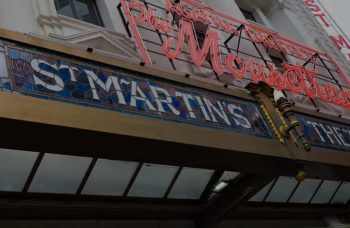The National Theatre in London continues to churn out gorgeous recordings from their catalogue of productions past. Through their National Theatre At Home program, every week brings a different play for theatre fans to stream at home as both a way to give audiences some comfort and pleasure during these strange times, as well as a way to drive donations as the theatre (and almost every other) will be closed to the public for an indefinite period. This week we are treated to National Theatre’s Small Island, a staged adaptation of the novel by Andrea Levy that explores the tense connections between a group of people of Jamaican and English descent and racism during and after World War II.
The story of Small Island tackles a lot of topics that are pertinent today, most evidently active and systemic racism against black people. The story begins with Hortense, a passionate and sensible school teacher in Jamaica who is deeply in love with her cousin Michael, a well-read but mischievous man, who has eyes for Hortense’s white American colleague. From the get-go, the subtle gems woven into the writing are evident. Hortense’s colleague treats hurricane as a romantic novelty despite its clear danger to the community, an absurd and clear micro-aggression where she puts herself as the centre of the story (which Hortense cleverly quips she is not); Michael begins expounding on Darwinian theory to goad his hyper-religious father, but Darwin’s own marriage to his cousin gives this reference a further layer.
As the show goes on we are met by Queenie, a humble but dream filled English woman scraping by with her milquetoast husband, Bernard, who we find is prone to fits of rage. We also meet Gilbert, a jokey and kindhearted man from the Caribbean who dreams of becoming a lawyer after his stint with the Allied Forces. Through Hortense’s past and present we see the culture and tribulations of her homeland, just as we see the realities of wartime England through the lens of Queenie’s life. Vile racism is brought up through Gilbert’s life in the military, as well as the differences between how nations perpetuate it at the time- England through an intensely bothered desire for separation, America through disdainful, murderous violence. The immense dissatisfaction and fallen-through promise of glory through war comprise the second act, and we see how, especially for Jamaican recruits, they were given little to show for their efforts.

National Theatre’s Small Island boasts all the production value of the acclaimed theatre’s other works, as well as the same graceful simplicity. Large scale projections of historical footage serve as the backdrops for transitions as well as radio reports from the time, easily cementing us in the world. The general lack of concrete set pieces or hard lines in lighting design for the first act gives an open and floating sense as these characters drift about life, eventually bumping into one another, while the second act gives a sense of transparent claustrophobia, taking place almost entirely in cramped rooms without walls for a backdrop. Singing also plays a punctuating role in natural form by only occurring at events (church, parties, funerals), and takes the edge off of some of the heaviest moments.
The cast is simply phenomenal. Every character has so much life breathed into it. Aisling Loftus is beautifully sympathetic as Queenie, and even well-meaning in her multiple incidences of prejudiced stereotypes towards Hortense and Gilbert, highlighting an important lesson for all would-be allies. Leah Harvey is heartbreaking in her gradual stiffening as Hortense, but her speech often bubbles with a hope attempting to break from her rigid self and her rigid surroundings. Gershwyn Eustache Jr. brings a needed levity to the flow with Gilbert, but every joke and witticism is so genuine and ripe with confidence that it in no way feels like comic relief. And it’s through Eustache’s scenes with Andrew Rothney, Bernard, that we see the intensity of both actors. Rothney has the energy of an old dog finally snapping one day before retreating back into its timidness, while Eustache has a cautious immediacy and endless dignity in the penultimate confrontation where he lays down the heart of this story:
“You know what your trouble is man?… Your white skin. You think it gives you the right to lord it over a black man, but you know what it make you? White. That is all, man. No better, no worse than me.”





